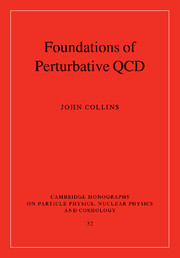Book contents
- Frontmatter
- Contents
- Dedication
- Acknowledgments
- 1 Introduction
- 2 Why QCD?
- 3 Basics of QCD
- 4 Infra-red safety and non-safety
- 5 Libby-Sterman analysis and power-counting
- 6 Parton model to parton theory: simple model theories
- 7 Parton theory: further developments
- 8 Factorization for DIS, mostly in simple field theories
- 9 Corrections to the parton model in QCD
- 10 Factorization and subtractions
- 11 DIS and related processes in QCD
- 12 Fragmentation functions: e+e- annihilation to hadrons, and SIDIS
- 13 TMD factorization
- 14 Inclusive processes in hadron-hadron collisions
- 15 Introduction to more advanced topics
- Appendix A Notations, conventions, standard mathematical results
- Appendix B Light-front coordinates, rapidity, etc.
- Appendix C Summary of primary results
- References
- Index
14 - Inclusive processes in hadron-hadron collisions
Published online by Cambridge University Press: 16 May 2011
- Frontmatter
- Contents
- Dedication
- Acknowledgments
- 1 Introduction
- 2 Why QCD?
- 3 Basics of QCD
- 4 Infra-red safety and non-safety
- 5 Libby-Sterman analysis and power-counting
- 6 Parton model to parton theory: simple model theories
- 7 Parton theory: further developments
- 8 Factorization for DIS, mostly in simple field theories
- 9 Corrections to the parton model in QCD
- 10 Factorization and subtractions
- 11 DIS and related processes in QCD
- 12 Fragmentation functions: e+e- annihilation to hadrons, and SIDIS
- 13 TMD factorization
- 14 Inclusive processes in hadron-hadron collisions
- 15 Introduction to more advanced topics
- Appendix A Notations, conventions, standard mathematical results
- Appendix B Light-front coordinates, rapidity, etc.
- Appendix C Summary of primary results
- References
- Index
Summary
In this chapter, I treat inclusive hard processes in hadron-hadron collisions. These give some of the most important practical applications of factorization. But the actual derivation has substantial extra difficulties, compared with other processes we have examined.
Technically the extra difficulties concern the Glauber region. In e+e- annihilation or SIDIS, we deformed loop momenta out of the Glauber region in individual (cut) graphs. But this is no longer possible in hadron-hadron collisions. This situation results from interactions between the spectator parts of the beam hadrons, as I will illustrate by an example in Sec. 14.3. To get factorization, we will need a sum over cuts of the graphs, which in turn entails a sum over different unobserved final states in an inclusive cross section. The technical details will be explained in Sec. 14.4 for the case of the Drell-Yan process.
After that we will obtain factorization, including the version using TMD parton densities. I will summarize the situation for more general reactions with detected hadrons of high transverse momentum. There is a surprising lack of detailed published proofs. Although the statements of factorization are essentially trivial generalizations of those for Drell-Yan, there are underlying complications in the physics which makes the justification of the generalizations quite non-trivial.
This work also leads us to the frontiers of the factorization approach, beyond which more general methods are needed, e.g., in diffractive hadron-hadron scattering.
- Type
- Chapter
- Information
- Foundations of Perturbative QCD , pp. 540 - 572Publisher: Cambridge University PressPrint publication year: 2011

